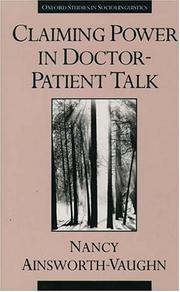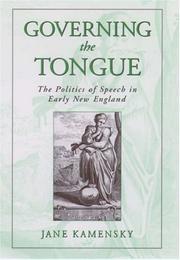| Listing 1 - 3 of 3 |
Sort by
|
Book
ISBN: 3110672618 3110672464 Year: 2023 Publisher: Berlin ; Boston : De Gruyter Mouton,
Abstract | Keywords | Export | Availability | Bookmark
 Loading...
Loading...Choose an application
- Reference Manager
- EndNote
- RefWorks (Direct export to RefWorks)
Hate speech has been extensively studied by disciplines such as social psychology, sociology, history, politics and law. Some significant areas of study have been the origins of hate speech in past and modern societies around the world; the way hate speech paves the way for harmful social movements; the socially destructive force of propaganda; and the legal responses to hate speech. On reviewing the literature, one major weakness stands out: hate speech, a crime perpetrated primarily by malicious and damaging language use, has no significant study in the field of linguistics. Historically, pragmatic theories have tended to address language as cooperative action, geared to reciprocally informative polite understanding. As a result of this idealized view of language, negative types of discourse such as harassment, defamation, hate speech, etc. have been neglected as objects of linguistic study. Since they go against social, moral and legal norms, many linguists have wrongly depicted those acts of wrong communication as unusual, anomalous or deviant when they are, in fact, usual and common in modern societies all over the world.The book analyses the challenges legal practitioners and linguists must meet when dealing with hate speech, especially with the advent of new technologies and social networks, and takes a linguistic perspective by targeting the knowledge the linguist can provide that makes harassment actionable.
Hate speech. --- Oral communication --- Speech acts (Linguistics). --- Social aspects. --- Applied Linguistics. --- Forensic Linguistics. --- Hate Speech. --- Illocutionary acts (Linguistics) --- Speech act theory (Linguistics) --- Speech events (Linguistics) --- Language and languages --- Linguistics --- Speech --- Oral transmission --- Speech communication --- Verbal communication --- Communication --- Defamation against groups --- Group defamation --- Group libel --- Racist speech --- Speech, Hate --- Libel and slander --- Philosophy

ISBN: 1280451149 9786610451142 1423765273 0195357256 1602560366 9781423765271 9781602560369 9780195096064 0195096061 9780195096071 019509607X 0195096061 019509607X 0197721346 Year: 2023 Publisher: New York ; Oxford University Press,
Abstract | Keywords | Export | Availability | Bookmark
 Loading...
Loading...Choose an application
- Reference Manager
- EndNote
- RefWorks (Direct export to RefWorks)
On the basis of taped interviews with doctors in a private practice setting, the author shows how patients, and doctors, can wield considerable influence in interactions by their employment of verbal strategies to construct power.
Physician and patient. --- Oral communication. --- Interpersonal relations. --- Human relations --- Interpersonal relationships --- Personal relations --- Relations, Interpersonal --- Relationships, Interpersonal --- Social behavior --- Social psychology --- Object relations (Psychoanalysis) --- Oral transmission --- Speech communication --- Verbal communication --- Communication --- Doctor and patient --- Doctor-patient relationships --- Patient and doctor --- Patient and physician --- Patient-doctor relationships --- Patient-physician relationships --- Patients and doctors --- Patients and physicians --- Physician-patient relationships --- Physicians and patients --- Interpersonal relations --- Fear of doctors --- Narrative medicine

ISBN: 1282384155 9786612384158 1602563853 0195130901 0195351363 1280449845 9786610449842 0198025157 0585223483 9780585223483 9781280449840 9780195090802 0195090802 6610449848 0195090802 9780195130904 9780195351361 0197713556 Year: 2023 Publisher: New York ; Oxford University Press,
Abstract | Keywords | Export | Availability | Bookmark
 Loading...
Loading...Choose an application
- Reference Manager
- EndNote
- RefWorks (Direct export to RefWorks)
This study explores why the spoken word assumed such importance in the culture of early New England. To aid her study, the author re-examines such famous Puritan events as the Salem witch trials and the banishment of Anne Hutchinson.
English language --- Puritans --- Language and culture --- Oral communication --- Americanisms --- Precisians --- Church polity --- Congregationalism --- Puritan movements --- Calvinism --- Germanic languages --- Oral transmission --- Speech communication --- Verbal communication --- Communication --- Culture and language --- Culture --- Political aspects --- Religious aspects --- Christianity. --- Spoken English --- Dialects --- Language. --- Provincialisms --- New England --- History --- Colonial period, ca. 1600-1775 --- English language - Political aspects - New England. --- New England - History - Colonial period, ca. 1600-1775. --- Languages. --- Northeastern States --- Women --- History.
| Listing 1 - 3 of 3 |
Sort by
|

 Search
Search Feedback
Feedback About UniCat
About UniCat  Help
Help News
News